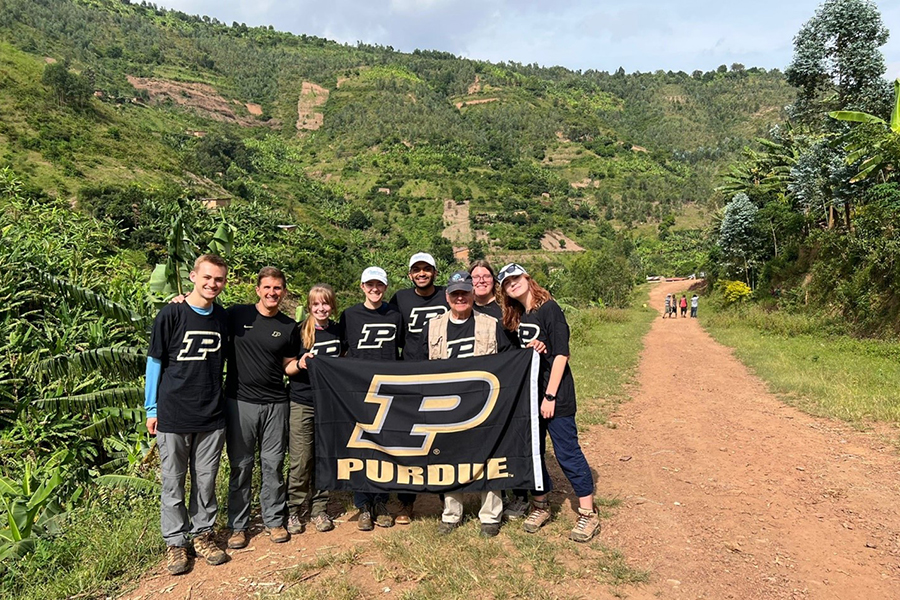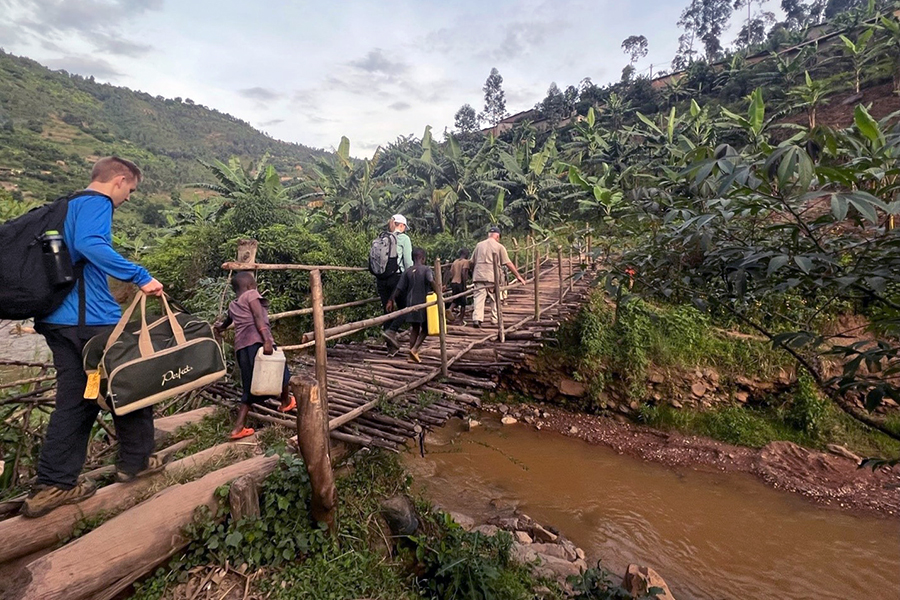Purdue engineering students travel to Rwanda to tackle water availability project

Members of a community in Rubona, Rwanda must embark on a long, uphill trek through mountainous terrain in order to reach the freshwater spring they rely on for clean water, posing a significant obstacle to water availability. In response, the Purdue chapter of Engineers Without Borders (EWB) hopes to construct a pipeline that runs water downhill from the spring to the village, making water more accessible to those who need it.
EWB-Purdue adopted the water availability project in December 2021 and began communicating with their in-country partners in Rwanda to establish a broad idea of the project goals and design of what the pipeline could look like. Following months of planning and virtual interactions, Purdue students Cat Bradley (chemical engineering), Christian Charlson (environmental engineering), Jack Feenstra (industrial engineering), Harish Raman (aeronautical and astronautical engineering), Lauren Sparber (civil engineering) and Allison Womer (mechanical engineering) and two advisors traveled onsite to Rubona in May 2022 for an assessment of the project area.
During the weeklong trip, the team collected technical data from the spring area and pipeline route and talked with members of the community about their needs to fill in the details of their project design.
“We had been doing all this work from afar, trying to figure out what the community was like and analyze what their problems were,” said Feenstra, a junior and the EWB-Purdue project manager. “But after all the remote work, to be there in person, spending time together, laughing together and having the community members talk with us directly, it was really powerful.”
The Purdue students collected geographic information of the pipeline route, including elevations and GPS coordinates to determine distances along the route as well as water quality data from the spring itself. Despite coming from a variety of engineering disciplines, the students had opportunities to learn and practice new skills through the data collection.
“It was an incredible opportunity to utilize the group’s engineering skills out in the field in a different environment. We could leverage what we were learning as engineering students to make a bigger impact,” Feenstra said.
In addition to technical data, the students spoke with various members of the community in focus groups to gain a better understanding of what their needs were.

“We were trying to understand what the community wants out of the system not just from what they were saying but from their lifestyle as well,” said senior Sparber, president of EWB-Purdue. “It helps us when we are designing to understand who and what we are designing for.”
Though a majority of the community members in Rubona spoke Kinyarwanda, the language barrier did not stop them from forming meaningful connections with the Purdue students. Cat Bradley, a junior, enjoyed her experience interacting with the children of the community and picking up bits of the native language.
“Even though we were communicating through a translator, we put a lot of effort into making sure the conversation felt personal,” Bradley said. “I also formed a really great connection with the kids. They started to teach me words, and of course, they would laugh at me because I wouldn’t say it right, but that’s OK. I would have them write the words down in a notebook, and as I came across new people, I would try to pull words from the notebook and say things to them.”
With the assessment trip complete, the team will spend the next several months compiling the data they collected into a post-trip report that can be used by the whole Purdue chapter to move forward with project planning. The students will hammer out the finer details of the pipeline design, figure out what further information is required and assess the project’s feasibility to determine whether the project can move forward. It is important that the project does not introduce any negative impacts to the community if it is to move forward.
“We don’t want to disrupt any of the good that the community has going on,” Sparber said. “We really emphasize that this project is a partnership. The community just doesn’t have all the resources that it needs to make this system, so that is what we are trying to help with.”
Though completion of the project is not guaranteed, the team remains hopeful that they will be able to return to Rubona next year and begin a phased construction of the pipeline that would be completed over multiple trips.
“With this trip we collected information, but the biggest goal and hope that we have for our next trip is that the community will have something to show for it,” Bradley said. “It may not be the final product, but we want to build something that they can use, something to give the community confidence that this project is going to happen.”
